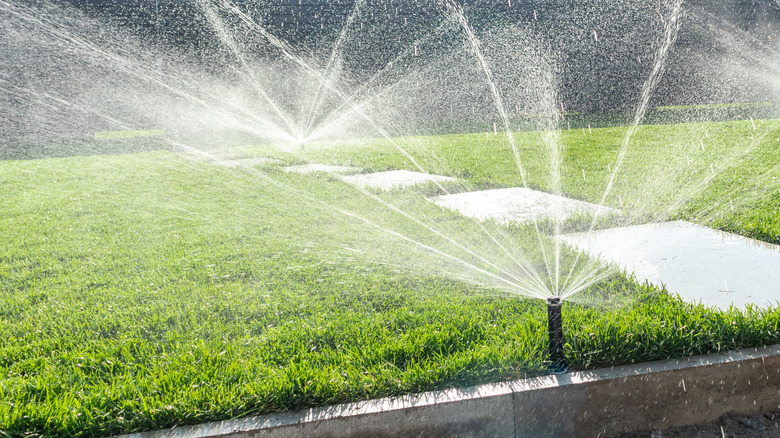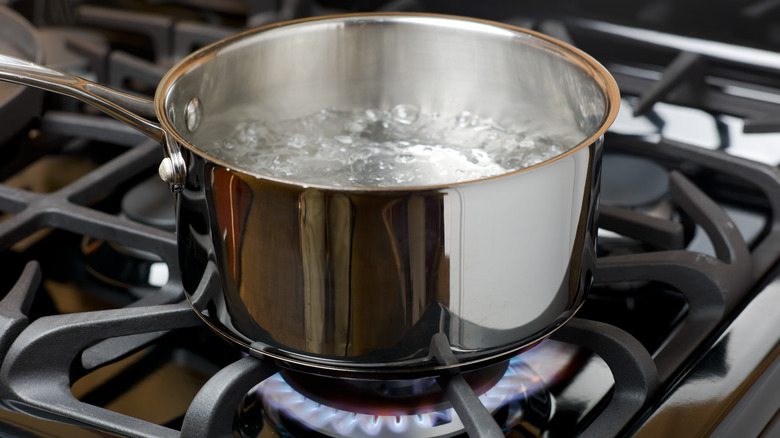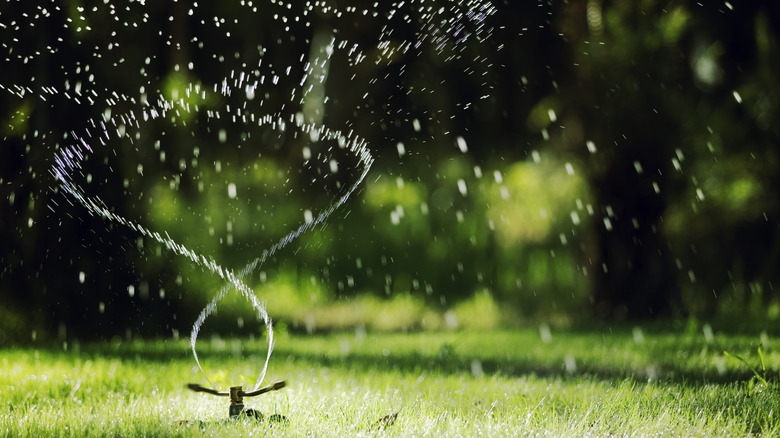Why You Should Avoid Watering Your Lawn With Hot Water
When you're trying to keep the grass in your yard as healthy as possible, following the proper sprinkling schedule is key. Knowing how much water you need to maintain your lawn is important, as is understanding the best time of day to sprinkle the lawn. But what about the temperature of that water? Does it matter? Technically, yes — ideally, you shouldn't make use of hot water to run a sprinkler on the lawn. If it happens once or twice during the summer, or only temporarily — such as because some of the water is hot from the hose sitting in the sunlight all day — it probably won't cause a huge problem. But if it's a regular occurrence, it could be dangerous for the plants that you're watering.
In fact, some people will use boiling water to kill lawn weeds. The high temperature often removes protective layers on the leaves and can even affect their roots with repeated exposure. Similarly, hot water can damage the portions of other plants that it comes into contact with, especially when they're still young. Still, if you try to kill weeds this way, you often have to apply boiling water again every seven to 10 days as the plant tries to recover, so your grass may also recover if hot water exposure happens only rarely.
What does hot water do to a plant?
Some people choose to boil water that they give to their plants — using the water from your boiled vegetables in your garden can provide some benefits from extra vitamins and minerals, for example. You may think that if this process is good for the garden soil, it'll be good for your lawn as well. While adding such nutrients may have some advantages for the grass, you definitely should not add still boiling or recently boiled liquid to the lawn. The extreme temperature can leave burns on the leaves and roots, affecting its abilities to absorb essential nutrients. If the damage is extensive or the grass has no opportunity to regrow essential parts before being doused with hot water again, it will eventually die.
It's worth noting that the temperature of the water from a sun-warmed hose can reach about 140 degrees Fahrenheit, nowhere near the 212-degree boiling point that potentially could kill weeds and grass plants. While using 140-degree water isn't ideal and can still cause scalding, it likely won't immediately cause the same kind of long-term damage that pouring boiling water on your grass could do. Ultimately, the danger arises from repeat damage. Using hot water on your grass plants from a hose that's been in the sun inadvertently once or twice over the summer is not likely to be an issue, but you should ensure it doesn't happen regularly.
Keeping your hose water cool
Even though occasionally running hot water through a sprinkler or sun-heated garden hose is unlikely to cause significant harm to your lawn, you still may not want to do it. If your hose has been left in the sun all day and the liquid inside is near that 140-degree Fahrenheit mark, that's still high enough to cause scalding burns if you, your kids, or your pets come into contact with it (per the U.S. Consumer Product Safety Commission). Of course, it's an easy enough fix — there are roughly 2.5 gallons of hot water trapped inside a 100-foot hose, so you could simply detach it from the sprinkler and run it into your driveway for about a minute to ensure it's replaced by cooler water first.
To avoid this problem altogether, consider storing your hose in a shed or in a shaded location between uses. This additionally prevents physical damage from the sunlight. Eventually, you may notice cracks in your hose from UV exposure, so keeping it out of the sun will prolong its lifespan and save you the effort of cooling down your water.
You could also focus on watering your lawn in the early to late morning before the hose can heat up, which will avoid more evaporation compared to watering in higher air temperatures. Grass roots most efficiently absorb water at 68 degrees Fahrenheit (per Canna Gardening), so sprinkling it with cooler water at cooler times of the day will be more effective.


